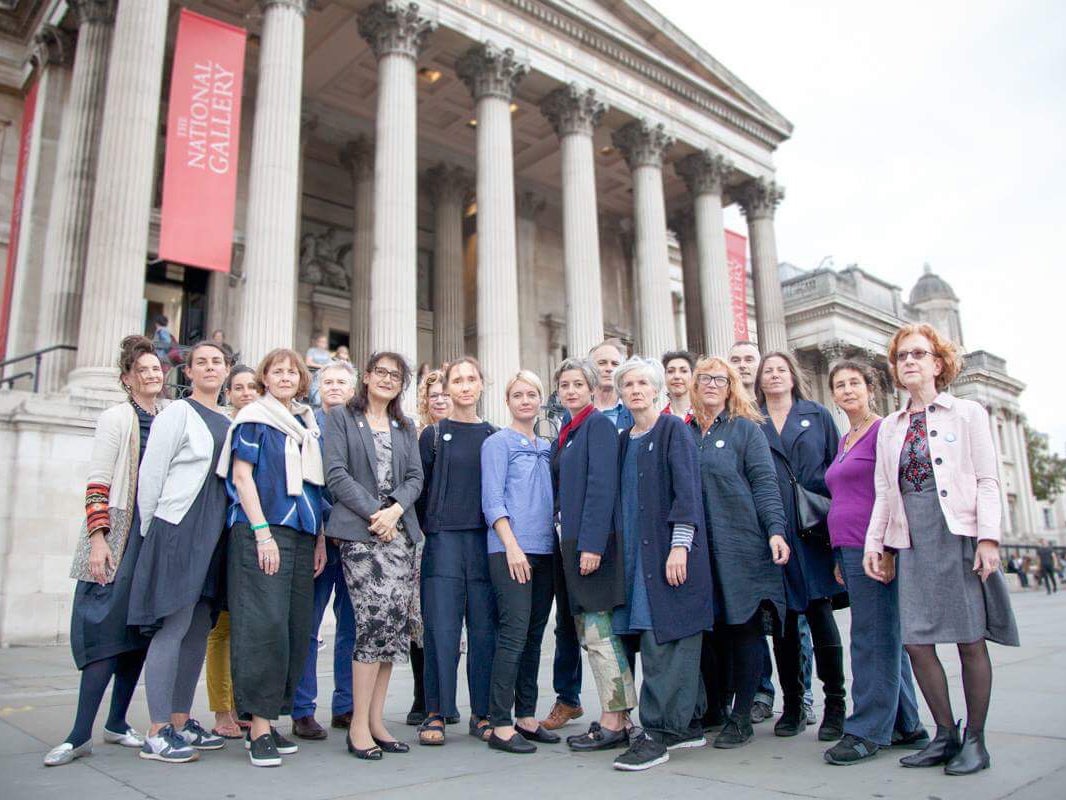National Gallery art educators win workers’ rights in ‘first public sector gig economy victory’
Tribunal rules ‘sacked’ art experts were not self-employed as London gallery claimed

Art educators who claim they were sacked by the National Gallery have won the right to be recognised as workers in a decision campaigners claimed “will have far-reaching consequences for employment in the gig economy and the public sector”.
The group of 27 artists and art lecturers, many of whom worked at the gallery for decades, brought the challenge in an employment tribunal last November.
The tribunal ruled on Thursday that they should have been classified as workers rather than self-employed.
Campaigners and some legal experts say that the decision will set a precedent for others with unconventional working hours or arrangements in public sector organisations.
A statement from the 27 educators, who call themselves the NG27, said that the case "is believed to be the first in the public sector and comes in the wake of several high profile gig economy cases”.
The group of educators said that in total they provided more than 500 years of service to the National Gallery, giving talks and running workshops for school tours and members of the public.
While the National Gallery argued the claimants were self-employed, the educators said that they worked regularly, were paid through the company payroll, taxed at source and were required to attend training sessions and appraisals.
When the gallery moved staff from temporary to permanent contracts, the educators claimed they were dismissed with just eight permanent contracts offered to the group on reduced salary and terms.
The tribunal found that it was “unsustainable” for the gallery to describe the workers as self-employed. It ruled that “it is unreal to describe the dealings between the parties as transactions in which the gallery stood as the ‘client or customer of any business undertaking’ carried on by any of the lead claimants”.
The educators also made claims of unfair dismissal, but these were dismissed.
Speaking after the ruling, Karly Allen, who worked for the gallery for 18 years, said: “This judgement cannot take away the fact that we have lost our jobs and the close relationship with the gallery which we loved. It does go some way to acknowledge the losses we have suffered and our contribution to the life of the gallery.”
Ms Allen also thanked those who had contributed to a crowdfunding campaign to assist with legal fees.
Marie van der Zyl, partner at Ince Gordon Dadds LLP, which represented the claimants said: “This is an important case for all those who have unconventional working arrangements. The world of work is changing and there will be many individuals who are unsure of their status and rights. This case gives those individuals hope.”
Rachel Collins, an employment specialist at Stevens & Bolton LLP, said: “This case is ground breaking as it establishes the incorrect categorisation of employment status in the public sector. It could well be the first of many cases to do so.
“Up to this point, we have seen multiple challenges but limited to the private sector. The courts’ willingness to look beyond contractual documentation to make a finding of worker status has been established in recent high court cases, such as Pimlico Plumbers and Uber, however yesterday’s judgment highlights that these issues are not isolated to the private sector and that it has a far wider ‘ripple’ effect.”
A National Gallery spokesperson said: “The gallery has not ‘dismissed’ anyone as part of this process. The majority of the people involved are still providing these services to us on the same basis as previously, whilst others involved in these claims have already accepted either employment or new contracts with us.
“It is important to state that this case should not be likened to the ‘gig economy’ debate that has been in the news recently, with legal cases brought against Hermes, Uber and Deliveroo.”

The spokesperson added: “The ‘gig economy’ cases have arisen out of organisations’ opting to offer people ad hoc employment, zero hours contracts and no opportunity for job security. We have taken a deliberate choice to move towards a model that offers people secure employment, with additional pension and worker benefits.
“At this time the gallery is considering the detailed implications of the decision with its legal advisers.”
Join our commenting forum
Join thought-provoking conversations, follow other Independent readers and see their replies
Comments
Bookmark popover
Removed from bookmarks